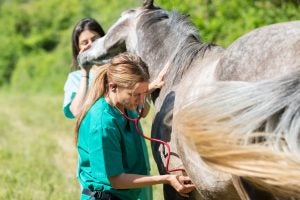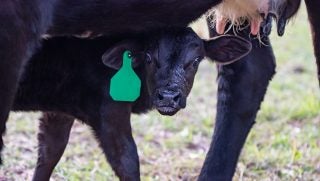The road to DVM status goes beyond a good challenge. In some respects, it’s greater than the trek to a human medical degree.
For perspective, the acceptance rate of veterinary graduate programs is safely within the 10 to 15 percent range. Certainly not an impossible feat, but it’s one that requires a lot of self-reflection and dedication for any hope of success.
Some time ago, I opened a piece of my heart in an article on why, even though I got a degree as an animal science major, the vet career was never on my radar.
However, many current and aspiring ag students see themselves doing nothing else. As I’ve watched even incredibly talented people struggle to get into vet school, or balking at the profession’s harsh realities, I’ve questioned — what do potential DVMs need to ask before making a very emotional and financial investment?
Having spoken to more than a few vets throughout my career, I wanted to convey their insights — those from actual and aspiring vet students who have been through this arena.
Love the animals, but also the learning
A common thread in every vet and student I speak to is the same — they have a deeply ingrained love for animals. Often, this begins early in life and blossoms as a field of study.
Hannah Jarvis, bearing her final and clinical year at Ohio State’s College of Veterinary Medicine, is a prime example having a deep livestock passion and background.
But as she advanced in her studies, there were serious, very difficult questions she had to ask herself — and at times she admits doubt. It took those hard moments to realize she wanted her career dream to be a reality.
“Colleges of veterinary medicine are not only extremely difficult to be admitted to, but the curriculum is rigorous,” she says. “You have to love what you are doing, love the animals and love the discipline. You have to want this deep down in your soul.”
This isn’t to say you need to thoroughly enjoy everything (chemistry anyone?) but it’s fair to say you need to have your study skills down to where your book learning isn’t overtly painful — and of course you need to care about your grades.
Marina Sweet, another Ohio State veterinary student, can elaborate further.
“A lot of kids that like animals grow up being asked ‘Are you going to be a veterinarian when you grow up?’ and it becomes a glorified job. It’s something that animal lovers think is the only career they can choose,” she says.
While veterinary medicine is a challenging, it certainly has its rewards, Sweet notes. Nonetheless, it takes some very specific and unique people to handle things such as high-stakes emotions, the pressure of constantly learning and unpredictable, long hours.

A degree of people skills is important
You’ve probably heard this one before: “I work with animals because I don’t like people.”
The sentiment is certainly understandable, but it shouldn’t be a guiding principle behind your career.
The fact of the matter is veterinarians spend a lot of time utilizing their professional and social skills. Yes, even large-animal practitioners.
This goes beyond being able to discuss and deliberate with difficult clients. You also have to keep in mind the higher education community you will be joining. To grow your career, practice and reputation — and find a circle of helpful colleagues you can lean on — building and maintaining bridges is crucial.
As with other agriculture professions, you will be attending networking events, offering advice, and maybe even running a full staff of employees someday. Don’t undercut the degree of poise and personal interaction you will need to develop and hone.

A passion for medical practice
As a whole, medicine is a very unique field. It encompasses science, technology, and history, as well as conjuring up challenge and a bit of mystery. It’s a far different road from animal management or business.
It helps to have a general interest in this vicinity before moving onwards.
For example, Maddy Johnson, a pre-vet graduate of the University of North Carolina and on the road to grad school, always had the medicinal spark taken from her mother’s nursing career.
“Most people know that to be a vet you need to love animals, but it’s a lot more than that,” says Johnson. “The job is very emotionally strenuous. To succeed as a vet, you need to be resilient, patient, flexible and cooperative. And you must have a good work life balance.”
One of the best ways that can help curious undergrads get a full understanding of this is to spend ample time shadowing vets in the types of practice you’re considering. (Many are happy to do this if you just ask!)
“Better yet, spend multiple days in a row shadowing to get an even better picture,” says Sweet. “I thought I would be a small animal or exotic pet veterinarian when I was young but realized I will only be happy working with livestock after years in 4-H, working on a multitude of farms and shadowing several different vets.”
Jaclyn Krymowski is a recent graduate of The Ohio State University with a major in animal industries and minor in agriculture communications. She is an enthusiastic “agvocate,” professional freelance writer, and blogs at the-herdbook.com.



